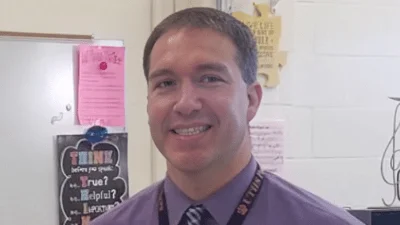Children's Hospital of Illinois: Moline recently issued the following announcement.
Crystal Dolbee had already discovered one lump on her breast when she was a teenager. That lump turned out to be benign. But when a new lump appeared in her forties, she now had three children, her family and a large extended family to think about.
“The new lump was starting to rub and irritate me,” Crystal said. “All my family and friends were telling me to get it checked out. My primary care provider, Kelly Martin, [advanced family practice nurse with OSF Medical Group – Godfrey] sent me for my first mammogram.”
The lump showed up on the mammogram, but the test also found another unknown lump in her left armpit. Biopsies were ordered.
“I went in for my follow-up appointment, and the doctor [Dr. Paul Loethen, surgeon, OSF HealthCare Saint Anthony’s Health Center] told me I had breast cancer,” Crystal said. “I was in shock. This had become real. It was personal. But he said we were going to take care of it. I was going to do chemotherapy, surgery and radiation, and we were going to focus on treatment.”
Dr. Loethen ordered additional genetic testing.
“I wanted to make sure I hadn’t passed anything to my kids. That was the most important thing on my mind,” Crystal said. “I was more stressed about that than my cancer. When we finally got the results, I was relieved to find that everything was negative.”
Crystal was referred to Dr. Manpreet Sandhu, hematologist and medical oncologist with OSF Saint Anthony’s Cancer Center. Dr. Sandhu had Crystal do six rounds of chemotherapy, and she rang the bell on Thursday, March 21, 2019, following her final chemotherapy treatment.
Life during chemotherapy
Crystal Dolbee and sons on couch“The first seven to 10 days following treatment were always the worst. I would feel like I had the flu. My energy would be gone. Complete exhaustion, unlike I ever experienced. I couldn’t get my momentum back.
“The chemo also affects your taste, smell, mood and energy. It changes your entire body. I got my treatments on Thursdays, and it would take me until the end of the next week to recover. During that week, I wouldn’t eat any fruits or anything with antioxidants. Antioxidants work against chemotherapy drugs, so I would wait until after the first week before getting any antioxidants.
“I also had short-term memory loss. My friends would say I have ‘chemo brain.’ I would be talking and forget what I was talking about. They would prompt me, and sometimes I would remember, but sometimes I wouldn’t. It was like my mind was in a fog.”
Surgery and radiation therapy
In April 2019, Dr. Loethen surgically removed the lump in her breast and the lymph nodes located in her armpit. Following the surgery, Crystal worked with Dr. James Piephoff, radiation oncologist at the OSF Saint Anthony’s Cancer Center.
“I had 36 radiation treatments. They weren’t as hard on me as chemotherapy, but I had to go to the office every time. I can’t imagine what it would have been like if I would have had to drive across the river [to St. Louis] for treatment,” Crystal said. “The treatments weren’t that bad. It was kind of like a sunburn. My skin dried out and was irritated.”
Crystal finished her treatments and rang the bell in Radiation Oncology on July 18.
The importance of breast cancer support network
Crystal Dolbee and teenage daughter cuddling at home.“I got support from the beginning. Heather [Jones, breast health patient navigator with OSF HealthCare] was my patient navigator, and she scheduled all my appointments and made sure I understood everything that was going on. Heather is always there for me.
“My family and friends have been with me the whole time. They help with what seems like the little things like the dishes and cleaning the house, but that is huge. You have no idea how much that means to me. If you have a loved one battling cancer, your support means everything. Whatever you can do means a lot.
“And I can’t forget my work family at McDonald’s. My boss, Mary, lets me work when I can. She has been wonderful. I had to cut back from 50 hours a week to 20, and sometimes I need to sit down and rest for a minute. But everyone has helped cover for me and give me time to rest.
“If you are diagnosed with cancer, you need to have a strong support network. It is essential to have people who are going to be there to comfort you and help you. Just knowing that they are available if needed is a great comfort.”
Take the OSF HealthCare online quiz to know your risk for breast cancer.
Original source can be found here.



 Alerts Sign-up
Alerts Sign-up